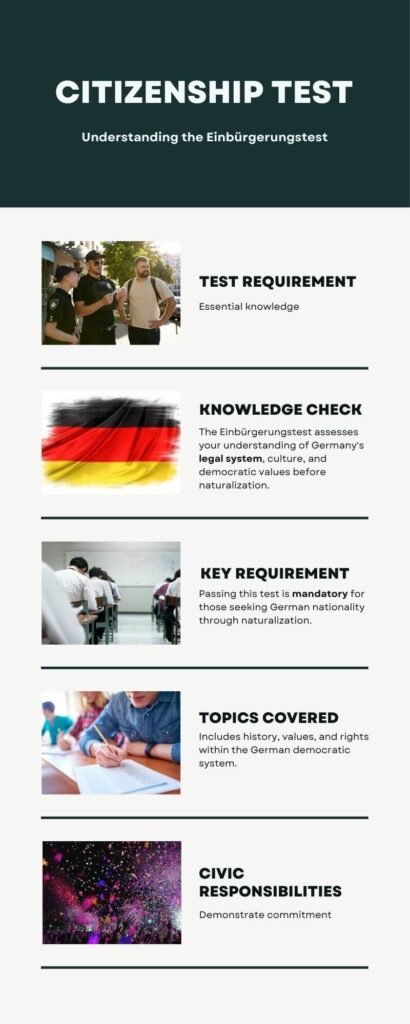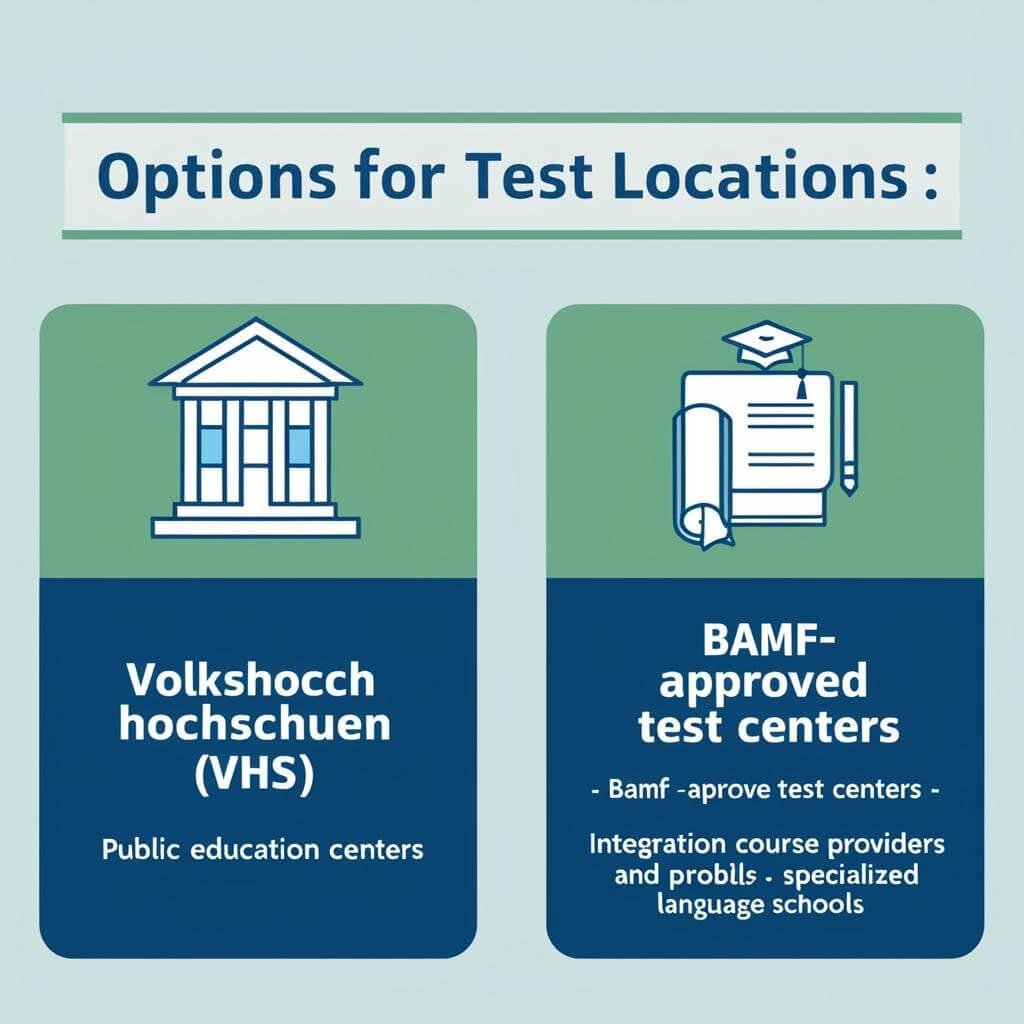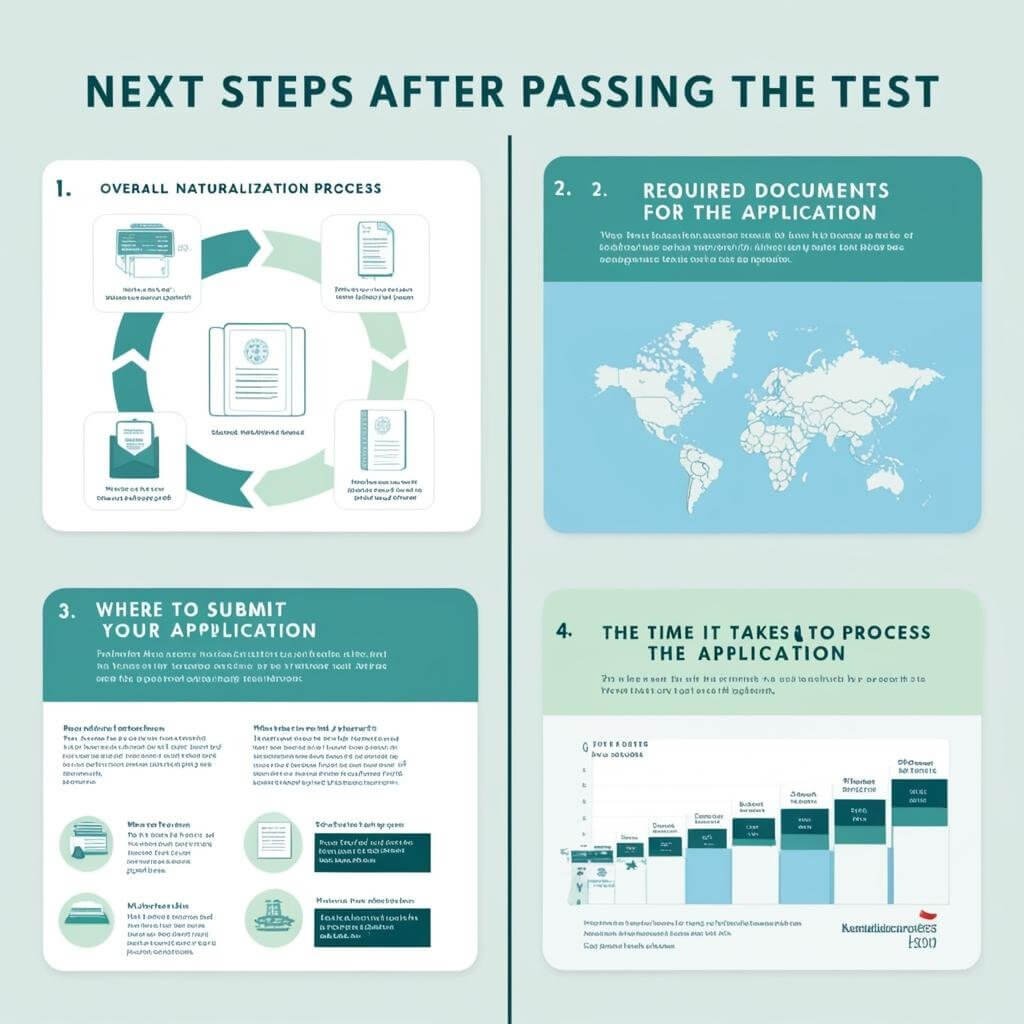The Einbürgerungstest is a mandatory test for those applying for German citizenship through naturalization. It evaluates knowledge of Germany’s legal system, history, culture, and democratic values. Passing this Test is a key requirement for obtaining German nationality.
Many applicants worry about the difficulty of the Test, the types of questions asked, and how best to prepare. Common concerns include:
- What topics does the test cover?
- How many questions do I need to answer correctly?
- Where can I take the Test, and what does it cost?
This guide answers these questions and more. You’ll learn about the test structure, sample questions, preparation resources, costs, and what to expect on test day. Whether you are just starting your German citizenship journey or ready to take the Test, this guide will help you succeed.
What is the German Citizenship Test?
The German Citizenship Test (Einbürgerungstest) is an official multiple-choice exam required for most adults applying for German naturalization. It assesses knowledge of Germany’s legal system, history, culture, and democratic values. The Test is regulated by the Bundesamt für Migration und Flüchtlinge (BAMF) and is based on German nationality law (Staatsangehörigkeitsgesetz, StAG).

Test Content
The Einbürgerungstest covers three key areas:
- Society & Culture – German customs, traditions, and everyday life.
- Politics & Law – German constitution, rights and duties, federal and state governance, democracy.
- History – Key historical events include WWII, reunification, and post-war Germany.
Format & Passing Criteria
- Total Questions: 33 multiple-choice questions.
- Correct Answers Needed: 17 out of 33 (minimum 51%) to pass.
- Question Bank: Questions are selected from 310 standardized questions, including three specific to your federal state.
The Test is available in German only and is designed to ensure applicants understand fundamental aspects of German life.
Who Needs to Take the Test?
The Einbürgerungstest is required for most adults applying for German citizenship through naturalization. It proves that applicants understand Germany’s legal and social systems.
Who Must Take the Test?
You need to take the Test if you:
- Are applying for German naturalization.
- Have not attended a German school or completed a German higher education degree.
- Do not qualify for any exemptions (see below).
Exemptions from the Test
You are not required to take the Einbürgerungstest if you meet any of the following conditions:
- Children under 16 years old.
- Individuals with permanent mental or physical disabilities (proof required).
- German school graduates (if you completed at least one German school qualification).
- Recognized asylum seekers or refugees who meet special conditions.
Test Content and Structure
The Einbürgerungstest consists of 33 multiple-choice questions covering three major subject areas. The questions assess your understanding of Germany’s political system, history, and societal values.
1. Politics in a Democracy (Politik in der Demokratie): This section covers Germany’s government structure, legal system, and constitutional rights. Topics include:
- Grundgesetz (Basic Law) – Fundamental rights and freedoms.
- Democracy & Elections – How the government is formed, voting rights.
- Federal & State Structure – Role of the Bundestag, Bundesrat, and Länder (federal states).
- Rule of Law & Responsibilities – Citizen duties, freedom of speech, and legal system.
Examples of the German citizenship test questions are
Example Question:
“What is the role of the Bundestag in Germany?”
A) It elects the Pope
B) It makes laws
C) It rules over the states
D) It controls the European Union
(Correct Answer: B – It makes laws).
2. History and Responsibility (Geschichte und Verantwortung): This section covers key historical events that shaped Germany. Topics include:
- German Unification (1871)
- Weimar Republic and Nazi Era (1919–1945)
- World War II and the Holocaust
- Cold War & Division of Germany (East & West Germany)
- German Reunification (1990)
Example Question:
“In what year did Germany become a reunified country?”
A) 1933
B) 1949
C) 1990
D) 2001
(Correct Answer: C – 1990).
3. People and Society (Mensch und Gesellschaft): This section tests knowledge about German culture, social values, and daily life. Topics include:
- Education System – School types and higher education.
- Religious & Cultural Diversity – Coexistence of different faiths and traditions.
- German Economy & Work Culture – Social security, workers’ rights.
- Everyday Life – German traditions, public holidays, and local customs.
Example Question:
“What is the name of Germany’s social security system?
A) Bundeswehr
B) Sozialversicherung
C) Bundestag
D) Schulsystem
(Correct Answer: B – Sozialversicherung).
“Land” (State-Specific) Questions: In addition to the general 30 questions, the Test includes 3 questions specific to the federal state (Bundesland) where you live. These cover local history, politics, and cultural aspects of your region.
Example for Bavaria (Bayern):
“What is the name of the state parliament in Bavaria?”
A) Landtag
B) Bundestag
C) Bundesrat
D) Kreistag
(Correct Answer: A – Landtag).
The Test Process
The Einbürgerungstest follows a structured process from registration to test completion. Below is a step-by-step guide on what to expect.
1. How to Register for the Test
You must register in advance to take the Test. Follow these steps:
- Find a Test Center: The Test is conducted at approved Volkshochschulen (adult education centres) and other authorized institutions. Use the BAMF test centre search tool (here).
- Fill Out a Registration Form: You can do this online or in person at your selected test centre.
- Pay the Test Fee: The Einbürgerungstest costs €25 (may vary by location). Payment is usually required at the time of registration.
- Receive Confirmation: You will get a test date and location confirmation from the test centre.
2. Where to Take the Test (Test Locations)

You must take the Test in person at an officially recognized testing centre. Some of the most common locations include:
- Volkshochschulen (VHS): Public education centres in most cities.
- BAMF-approved test centres: These can consist of integration course providers and specialized language schools.
To find the nearest authorized test centre, visit the BAMF website (here).
3. What to Bring to the Test
On the test day, you must bring a valid passport or residence permit for identification. Some centres may also ask for your registration confirmation or the payment receipt, so it’s best to carry those. Electronic devices, notes, or dictionaries are not allowed during the Test.
4. What Happens During the Test?
You will receive a paper-based multiple-choice questionnaire with 33 questions at the test centre. Each question has four possible answers; you must select the correct one. The Test is conducted only in German; no translations or external help are provided. The environment is quiet, and an examiner ensures fair conditions for all candidates.
5. Time Limit for the Test
You have 60 minutes to complete the Test. Most candidates finish within 30 to 45 minutes, as the questions are straightforward. Once you submit your answer sheet, it is sent for evaluation. The results are usually available within a few weeks.
Preparing for the German Citizenship Test
Preparing for the Einbürgerungstest is essential to ensure a passing score. The Test is not overly complex, but proper preparation will boost your confidence and improve your chances of success.
Official Resources from BAMF
The Bundesamt für Migration und Flüchtlinge (BAMF) provides an official question catalogue with 310 multiple-choice questions, from which the test questions are selected. You can access the official catalogue here:
👉 BAMF Official Question Catalog: This catalogue allows you to study all possible test questions, including the three state-specific questions based on your federal state.
Online Practice Tests and Reliable Resources
Practising online is one of the best ways to prepare. Several websites offer free mock tests that simulate the actual exam. Here are some reliable platforms:
- BAMF’s Official Online Test Simulator – Test your knowledge here
- Volkshochschule (VHS) Practice Portal – VHS Sample Questions
- Einbürgerungstest Online Practice (Test your German Citizenship Knowledge) – einbuergerungstest-online.eu
These resources allow you to practice real test questions in an interactive format.
Study Tips and Strategies
To prepare effectively, focus on understanding key topics rather than memorizing answers. Here are some valuable strategies:
- Study the official question catalogue and identify recurring themes.
- Take online practice tests regularly to familiarize yourself with the format.
- Read about German history, law, and society in simple German to build comprehension.
- Follow German news to stay informed about politics and social issues.
- Use flashcards or study apps to reinforce learning.
Importance of Understanding German History and Current Events
A solid grasp of German history is crucial, as many questions relate to events like World War II, the reunification of Germany, and the democratic system. Keeping up with current affairs also helps; some questions may touch on Germany’s government and policies. Reading news sites like Tagesschau, Deutsche Welle, or local newspapers can be beneficial.
Explanation of the Official Handbook
BAMF offers an official handbook that explains Germany’s legal system, history, and social values. This book is handy for those who want a comprehensive understanding beyond answering multiple-choice questions. You can often get a copy from Volkshochschulen or download materials from the BAMF website.
German Citizenship Test Cost and Results
The Einbürgerungstest costs €25. This fee applies to all applicants and must be paid during registration. Some test centres may offer different payment methods, so it’s best to check with your chosen location.
How and When You Receive Your Test Results
After taking the Test, your answer sheet is sent to the BAMF for evaluation. The processing time varies, but most candidates receive their results within three to six weeks.
Your results will be mailed to the address you provided during registration. Some test centres also allow you to collect your results in person.
What Happens if You Fail the Test?
You do not pass the Test if you fail to answer at least 17 out of 33 questions correctly. However, you can retake the Test as many times as needed. There is no waiting period, but you must register again and pay the €25 fee for each attempt.
To improve your chances of passing, review the official question catalogue, take online practice tests, and focus on understanding key topics.
What Documents Do You Receive When You Pass?
If you pass the Einbürgerungstest, you will receive an official certificate from BAMF confirming your result. This document is an integral part of your German naturalization application. You must submit it to your local naturalization office (Einbürgerungsbehörde) as proof that you meet the knowledge requirement for German citizenship.
Next Steps After Passing the Test

Passing the Einbürgerungstest is an important milestone, but it’s just one part of the naturalization process. After passing the Test, you must submit a naturalization application and meet other requirements to obtain German citizenship.
The Overall Naturalization Process
After passing the Test, the following steps include:
- Gathering all required documents for your application.
- Applying at your local naturalization office (Einbürgerungsbehörde).
- Paying the naturalization fee (€255 per adult, €51 per child).
- 4. Waiting for the authorities to process your application (this can take several months).
- 5. Receiving a decision and attending a naturalization ceremony (if approved).
Required Documents for the Application
To apply for German citizenship, you need the following:
- Completed naturalization application form (available from your local Einbürgerungsbehörde).
- Valid passport or residence permit.
- Proof of legal residence in Germany for at least 8 years (or 6 years in exceptional cases).
- Einbürgerungstest certificate (or proof of exemption).
- B1-level German language certificate (e.g., Goethe-Zertifikat B1, TELC B1).
- Proof of financial stability (employment contract, tax returns, or social security contributions).
- No criminal record (a background check will be conducted).
Where to Submit the Application
You must submit your application at your city’s Einbürgerungsbehörde (naturalization office). The exact office varies by location, but it is usually part of the local foreigners’ office (Ausländerbehörde) or city administration. Some federal states allow online submission or initial appointments via email.
Time Required for Processing
The processing time for a German naturalization application varies by location and individual circumstances. It takes between 6 to 12 months to receive a decision. Factors that influence processing time include:
- Completeness of your application – Missing documents can cause delays.
- The workload of the naturalization office – Larger cities may take longer due to high demand.
- Background checks and approvals – Authorities verify your legal and financial status before granting citizenship.
Once your application is approved, you will be invited to a naturalization ceremony, where you will receive your certificate of German citizenship and officially become a German citizen.
Common Mistakes and How to Avoid Them
Even though the Einbürgerungstest is straightforward, some applicants fail due to avoidable mistakes. Below are the most common errors and tips on how to overcome them.
1. Lack of Preparation
Some applicants assume the Test is easy and do not study enough. However, questions cover specific details about German history, politics, and society, which require preparation.
✅ How to Avoid It:
- Use the BAMF official question catalogue and practice all 310 possible questions.
- Take online practice tests to familiarize yourself with the format.
- Set aside time daily to study and review key topics.
2. Misunderstanding Questions
Since the Test is in German, some applicants misinterpret questions, especially if their language skills are weak. Some questions also include tricky wording that can confuse test-takers.
✅ How to Avoid It:
- Read each question slowly and carefully before selecting an answer.
- Pay attention to words like nicht (not) or double negatives.
- Improve your German comprehension skills by reading about German history and society.
3. Not Knowing the Local Bundesland Questions
The Test includes three unique questions for each federal state (Bundesland). Many applicants focus only on general queries and fail because they do not study state-specific topics.
✅ How to Avoid It:
- Find out which Bundesland you are registered in and study the three questions.
- Use the BAMF online practice test to review your state’s unique questions.
- Research your state’s government structure, historical events, and cultural aspects.
4. Anxiety and Test-Taking Stress
Some candidates panic on test day, leading to careless mistakes or second-guessing correct answers. Stress can also cause mental blocks, making it harder to recall studied information.
✅ How to Avoid It:
- Take deep breaths and stay calm before starting the Test.
- Trust your preparation—if you have studied, you already know the answers.
- Sleep well the night before and eat a light meal to stay focused.
Useful Resources and Links
To help you prepare for the Einbürgerungstest, here are the most reliable and official resources for study materials, practice tests, and community support.
📌 Official BAMF Question Catalog (PDF) – Download here
📌 BAMF Online Practice Test – Take the Test here
📌 Volkshochschule (VHS) Learning Portal – Practice with free exercises
🛂 German Federal Ministry of the Interior (BMI) – Citizenship Laws and Policies
📜 German Nationality Act (Staatsangehörigkeitsgesetz – StAG) – Full legal text
Conclusion
The German Citizenship Test (Einbürgerungstest) is a crucial step in the naturalization process. It evaluates your knowledge of Germany’s politics, history, and society, ensuring you understand its fundamental values.
To succeed, focus on thorough preparation. Use official BAMF resources, take online practice tests, and review state-specific questions for your Bundesland. Understanding German history, government structure, and social norms will make answering the multiple-choice questions easier.
The Test is affordable (€25), and even if you fail, you can retake it without restrictions. Once you pass, your certificate is essential for your citizenship application.
If you are well-prepared, there’s no need to stress. Approach the Test confidently, knowing that the right resources and study techniques will help you succeed. Your journey to German citizenship is within reach—take the next step today!
FAQ
Is German citizenship worth it?
Yes. It offers EU freedom of movement, a strong passport, and social benefits.
How hard is the German citizenship test?
It’s not very hard if you prepare. You need to answer 17 out of 33 questions correctly.
Is B2 required for German citizenship?
No, a B1 German language level is required.
What questions are on the German citizenship test?
Topics include politics, history, law, society, and state-specific questions.
Which passport is stronger, Germany or the UK?
Germany’s passport is more substantial and has visa-free access to more countries than the UK.
How can I get German citizenship fast?
Marry a German citizen (after 3 years of residence) or apply after 6 years with special integration efforts.
What are the three strongest passports in the world?
As of 2024, Singapore, Germany, and Italy have the strongest passports.
How can I become a 5-year German citizen?
You generally need 8 years, but 5 years is possible for refugees or highly skilled professionals in exceptional cases.
How strong is a German passport?
Very strong. It allows visa-free or visa-on-arrival access to 190+ countries.

